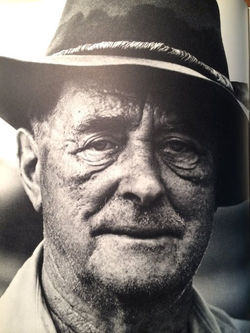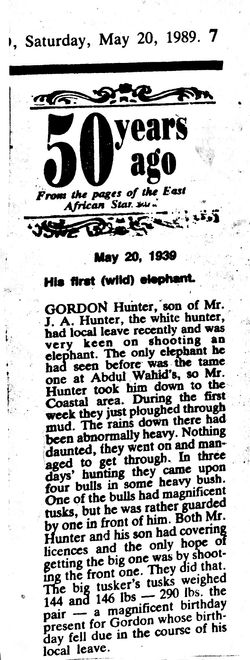HUNTERS IN KENYA
EXCERPTS
 |  |  |
|---|---|---|
 |  |  |
 |  |  |
 |  |  |
 |  |  |
 |  |  |
 |  |
JOHN ALEXANDER HUNTER
1887 - 1963
JOHN ALEXANDER HUNTER
1887 - 1963
No man ever lived up to his surname as thoroughly as John Alexander Hunter. Born in 1887 in Dumfriesshire, Scotland, and like Frederick Courteney Selous a couple of generations before, Hunter grew up fascinated with forest, stream and field, and was absolutely incapable of being broken to plough or office. His father was a farmer, but J.A. showed little interest in anything other than fishing and hunting, spending most of his time in the glens of his native Scotland. And, well, there was one other thing:
“When I was 18, I got in a serious scrape,” he recalled. “The lasses in that part of Scotland had changed little since the days of Robbie Burns, and were not miserly with their favours. I had my share of good times, but, although I fancied myself a man of experience, I was still only a lad and I fell deeply in love with an older woman.”
The busybody local minister remonstrated against this relationship, promising hell and damnation, and badly embarrassing young John Alexander’s family. They happened upon the one thing that could turn J.A. Hunter’s head and heart away from a paramour: they proposed to ship him off to relatives in British East Africa. He wrote in his journal:
There were lions in Africa, and elephants and rhinoceros. That was the land for me. I was ready to leave that night and so I told my father. As my father left the room, he hesitated moment at the door. “Son, you may take the Purdey,” he said. Then I knew that he had forgiven all my sins.
So, in 1907, at the age of 21, armed with his father’s Purdey shotgun and an old Boer War Mauser rifle, J.A. Hunter set out for East Africa, in search of a life of purpose and excitement, as was the wont of so many others born in that era. On arrival in British East Africa, J.A. joined an elite fraternity of hunters who pioneered safaris and hunting in the relatively unknown wild lands of present-day Kenya, Uganda and Tanzania, and soon made a name for himself as one of the top professional hunters of his generation.
J.A. Hunter was a professional hunter for 50 years — a safari guide and a government contract game control agent, tasked with clearing game from areas that were to be opened up for settlement. In this role, he hunted hard from 1908 through the 1950s, killing some 1,400 elephants, and untold numbers of rhinoceros and lion. In Makueni, Hunter killed 996 rhino is one year alone – and this is why Alex chose to champion a rhino on his logo – not to revere his grandfather’s efforts, but more to remember the need for the conservation of rhino today.
Such profligate killing just feels bad to us now, but it was a different time, and Africa’s game lands seemed inexhaustible. Yet, even in his own day, it became apparent that this wasn’t so, and Hunter, like many of the bold and honourable men of his trade, became an advocate of conservation as the impact of civilization became increasingly clear, helping to forge out and found many of Kenya’s national parks that we know today, including his beloved Tsavo National Park.
Hunter was a good friend of Denys Finch-Hatton, immortalized in Isak Dinesen’s Out of Africa. He was the first on the scene of Finch-Hatton’s fatal plane crash in Tsavo.
Later on, J.A. turned his hand to writing, and penned several books, the most famous being his autobiography, simply titled Hunter - a fine read and a bestseller in 1952: the classic African hunter’s memoir. He had a dry sense of humour and it comes across well in his writings.
J.A. married Hilda Bunbury in 1918, and she seemed to have kept the old dog on the porch pretty effectively. They had six children.
Hunter led the Livermore expedition into the interior of East Africa, which opened up the Ngorongoro Crater to European hunters. He guided everyone from titled nobles to captains of industry on safari. He took all manner of extremely dangerous game control assignments. In 1958, he built the Hunters Lodge hotel in Makindu, Kenya. He died there in 1963, after a life lived to the full.
